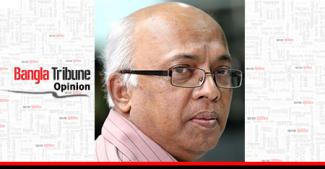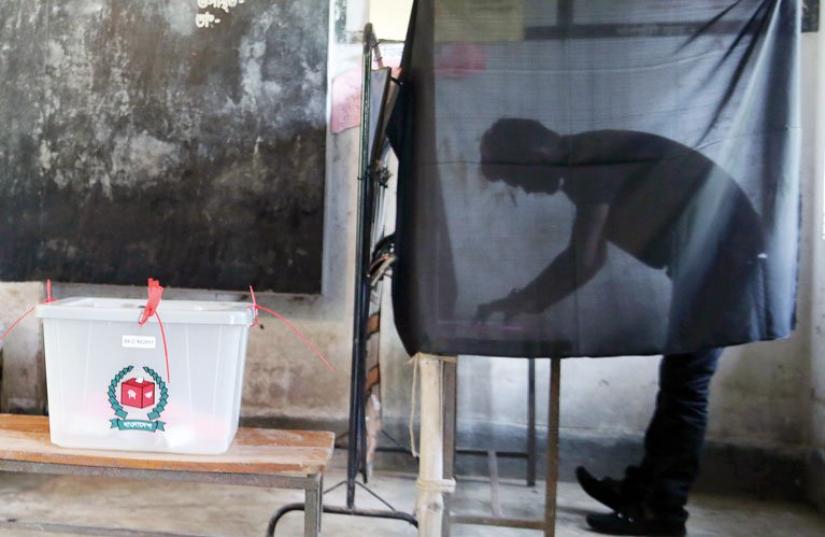 Democracy comes with its pitfalls. It is certainly not the best form of government, but given the medley of political formulations the world is burdened with, it is rather a tolerable one. Even so, there are the irritants which come with democracy. One only has to observe what has been happening, or not happening, in the western world in these present times to come by an image of democracy running into a quagmire.
Democracy comes with its pitfalls. It is certainly not the best form of government, but given the medley of political formulations the world is burdened with, it is rather a tolerable one. Even so, there are the irritants which come with democracy. One only has to observe what has been happening, or not happening, in the western world in these present times to come by an image of democracy running into a quagmire.
If through all these decades America has been a byword for political pluralism, that idea has been turned on its head through the arrival of Donald Trump in the White House. It is not merely that the man, with absolutely little experience of politics, has uniquely been unqualified to be President of the United States. The bigger reality is that since he was placed in the presidency, by design or stealth or default --- think here of his Russia connections all the way to the November 2016 election --- he has conspicuously attempted to undermine the very best about America’s democratic heritage. He has lied and continues to do so; he remains guilty of sexual sins and crimes; and he is deeply disrespectful to people, particularly those wiser and more experienced than he.
And yet under the terms of democracy, Trump today occupies an office which once boasted the presence of Lincoln, the two Roosevelts, Carter, Reagan and Obama. Well, as they keep saying after every election, the American people have spoken. The harsh truth is that in democracy the people do not always speak well or wisely and not just in America. When an individual thoroughly prepared to be President, as Hillary Clinton was, is pushed aside in favour of unbridled mediocrity, the flaws of democracy become self-evident. When the US Supreme Court steps in to stop the counting of votes in Florida, the clear indications till then being of Al Gore on the way to succeed Bill Clinton, and declares George W. Bush the next President of the United States, democracy goes through internal bleeding.
If democracy has caused bad convulsions in America, it is causing similar problems in Britain over the issue of Brexit. Back when the referendum on the question of the country’s presence in or exit from the European Union was called by David Cameron two and a half years ago, little did anyone imagine that a majority would vote for Leave. But that is precisely what happened. A perfectly good exercise in democracy caused, as events since then have demonstrated, an unforeseen crisis in democracy. Cameron lost his job and his successor Theresa May has been struggling mighty hard to have Britain make a decent exit from the EU. In the process, she has put her job on the line; her deal with the EU was torpedoed badly in the House of Commons; and she survived a no-confidence motion in parliament. Her problems are not over, though. She will travel to Brussels again to try to persuade the EU to give her some more concessions before Brexit happens in March this year. What happens if the EU does not oblige her? The answer is simple: democracy will be caught in a new straitjacket. It is tempting to think that democracy is the answer to the world’s problems, but remember that in our times the fall of communism and the rise of democracy in Eastern Europe caused the break-up of Czechoslovakia, the murder of Romania’s Nicolae Ceausescu and the disintegration of Tito’s Yugoslavia. Way back in the early 1930s, it was a democratic exercise of the vote which placed Adolf Hitler on the road to power. Through democracy the likes of Marine Le Pen and Geert Wilders have occupied centre stage in Europe. And it is not just in Europe that we observe the impediments to social order caused by democracy. If a rabid individual like Yogi Adityanath takes charge of the Indian state of Uttar Pradesh and Rodrigo Duterte achieves power in the Philippines, there is quite a good deal to be said about the flaws democratic politics is riddled with. Democracy often helps the process of authoritarianism, to a point where men like Recep Tayyip Erdogan and Alberto Fujimori are encouraged to wield brute authority in putting down their real and imagined enemies. Institutions then begin to develop bad cracks.
The answer is simple: democracy will be caught in a new straitjacket. It is tempting to think that democracy is the answer to the world’s problems, but remember that in our times the fall of communism and the rise of democracy in Eastern Europe caused the break-up of Czechoslovakia, the murder of Romania’s Nicolae Ceausescu and the disintegration of Tito’s Yugoslavia. Way back in the early 1930s, it was a democratic exercise of the vote which placed Adolf Hitler on the road to power. Through democracy the likes of Marine Le Pen and Geert Wilders have occupied centre stage in Europe. And it is not just in Europe that we observe the impediments to social order caused by democracy. If a rabid individual like Yogi Adityanath takes charge of the Indian state of Uttar Pradesh and Rodrigo Duterte achieves power in the Philippines, there is quite a good deal to be said about the flaws democratic politics is riddled with. Democracy often helps the process of authoritarianism, to a point where men like Recep Tayyip Erdogan and Alberto Fujimori are encouraged to wield brute authority in putting down their real and imagined enemies. Institutions then begin to develop bad cracks.
It all begs the question: should and can democracy be reformed? The instance of Lee Kwan Yew in Singapore is tempting, for he was able through his harsh democratic system to place his city-state among the most respected nations in the world. But, again, harshness has no business being part of democracy, a truth emphasized over and over again during Mahathir Mohamad’s earlier authoritarian governance of Malaysia. But the worry remains: how do we ensure that democracy does not throw up leaders whose hands constantly reach out, endlessly itch, to press the buttons that will give them a monopoly over democracy in ways that threaten the very concept of democracy?
If men like Jair Bolsonaro in Brazil win democratic elections and then proceed to undermine the very values which sustain pluralism, what future for the right of people to elect governments in line with their aspirations? Again, do people always choose their leaders judiciously when they cast their ballots?
Syed Badrul Ahsan is Editor-in-Charge, The Asian Age.


